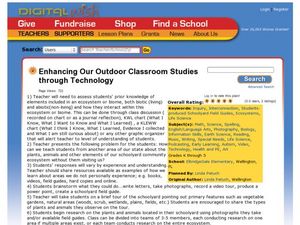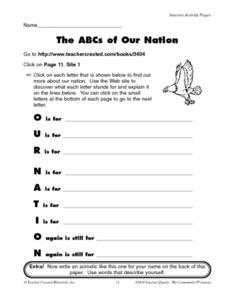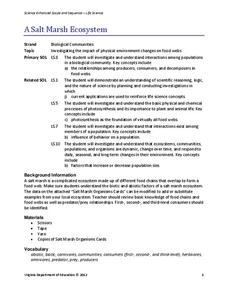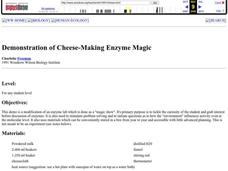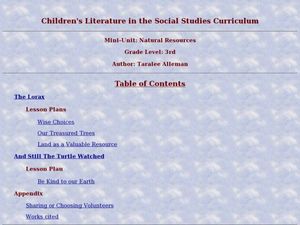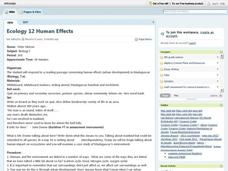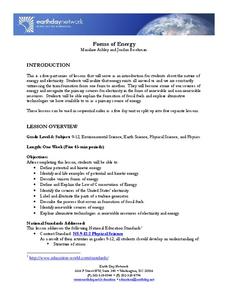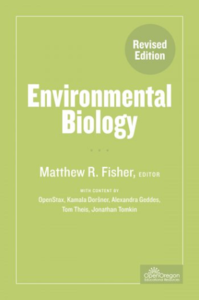Clean Up Australia
Why are Batteries Harmful to the Environment?
Open this lesson plan by reading together about primary and secondary batteries (such as nickel-cadmium cells), problems they can cause in the environment, and how humans can minimize the damage. Afterward, little ones examine a...
Curated OER
Enhancing Our Outdoor Classroom Studies through Technology
Combine science, math, and more using this resource. Learners use technology to share video and other information about their community with people throughout the state. They learn about the environment, identifying native plants, record...
Virginia Department of Education
Changes in Ecosystems
How does water pollution affect the environment? Provide your class with the resources to answer this question as they learn about eutrophication and ecosystem changes. Over two weeks, they simulate the effects of pollution on the...
Curated OER
Cloudy with a Chance of Meatballs
Young scholars explore the 5 themes of geography. In this cross curriculum literacy and geography lesson, students listen to Cloudy with a Chance of Meatballs by Judi Barrett, and make a list of the needs of the people in Chewandswallow....
Curated OER
environment: Fresh and Saltwater Habitats
Students compare and contrast fresh and salt water coastal environments. After describing how sea animals adapt to their habitats, they design a variety of sea creatures and explain how the adaptations aid in the animals' survival. ...
Curated OER
The ABCs of Our Nation
In this social studies worksheet, students are directed to a Web site to find out what makes our Nation special. Students create an acrostic poem about our country. Students then explore the need for responsible living within a community...
Virginia Department of Education
A Salt Marsh Ecosystem
What a web we weave. Pupils use yarn as the primary resource to create a web depicting the intricacies of a salt marsh ecosystem. They participate in a question and answer session, which leads to an in-depth facilitated discussion...
Curated OER
Standard 4 Review Sheet-Key Ideas Biology-The Living Environment
In this living environment worksheet, high schoolers answer a variety of questions about living organisms, the processes they go through to make food and break down food, absorb nutrients, and release toxins. They explain homeostasis,...
Virginia Department of Education
Go with the Flow
How does nature's hierarchy relate to our local human environment? Answer this question, along with others, as the class visually depicts the natural hierarchy provided by nature. Pupils discuss each piece of the pyramid and its energy...
Pulitzer Center
The Global Water Crisis
High schoolers examine the "quiet crisis," the lack of clean water, by reading articles and viewing video clips. They discuss the situations in Ethiopia, Yemen, Kenya, and Nepal. There are two options for the lesson, but one of them...
Curated OER
Demonstration of Cheese-Making Enzyme Magic
Students participate in a modified demo enzyme lab, a "magic show." The purpose of the demo is to tickle the curiosity of the student and grab their interest before discussions of enzymes. Its purpose is also to stimulate problem solving...
Curated OER
Solid Waste and Our Natural Resources: Utilizing the Story THE LORAX
Students gain an introduction to our planet's solid waste problem and our personal responsibility in curbing and solving said problem through the use of Dr. Seuss' book, The Lorax. After hearing the book, class discussion follows.
Curated OER
Be Kind to our Earth
Students make a list of ideas on ways we can take care of our Earth and complete a class project planning sheet where they problem solve to help save the Earth. In this Earth lesson plan, students also play a conservation charades game.
Curated OER
Ecology 12 Human Effects
Students are able to respond to a reading passage concerning human effects (under development) in Madagascar. They have a quiz on primary and secondary succesion as their bell ringer. Students write an essay on the topic "No man is an...
Curated OER
Cycles of Life in an Urban Habitat: Changes in Biodiversity
Second graders compare and contrast animate and inanimate objects. In this environmental science lesson, 2nd graders create simple food webs. They observe their environment and create a collage about it.
Curated OER
Fun With Food Chains
Students explore our ecosystem by researching animal eating habits. In this food chain lesson, students identify the links between predator and prey and the energy that passes between organisms based on what their diet consists of....
Curated OER
Crops 2: What Plants Need to Grow
Students explore agriculture by participating in a plant growth activity. In this botany lesson plan, students discuss what types of plants grow in their local environment and what the plants need to survive. Students read assigned text...
Virginia Department of Education
Freshwater Food Chains
What's in the water? Encourage your class to further explore this question and learn about pond ecosystems, food chains, and food webs as they complete this hands-on activity. They view the environment from a new perspective...
Earth Day Network
Forms of Energy
Give me a home where electric buffalo roam and I'll show you an ohm on the range. Introduction your classes to potential and kinetic energy, electricity, and renewable resources with a resource that combines observation, direct...
Virginia Department of Education
The Cycles of Nature
Encourage peer collaboration and assist with the creation of visual aids to identify carbon, water, and nitrogen cycles as your class learns more about nature. They discuss relative information, create a visual aid...
Virginia Department of Education
Owl Family Natural Selection
How do genetic mutations within a population lead to future variations? Provide your class with the resources to answer this question and more upon completing an activity on natural selection. The entire class participates in a...
Curated OER
Food Chain
Fourth graders explore the concept of food chains. In this food chain lesson, 4th graders discuss what different animals eat and how they are all connected. Students explore a garden and the environment around them to find examples of a...
Open Oregon Educational Resources
Environmental Biology
Everyone has a responsibility to take care of the environment. Give learners a sense of our environmental concerns with a complete course on environmental biology. The textbook resource includes instruction on topics such as population...
Curated OER
Our Treasured Trees
Young scholars discuss natural resources and renewable resources with trees being considered renewable resources which need special attention. In this Earth science lesson, students write a list of reasons for why it would be good to...

